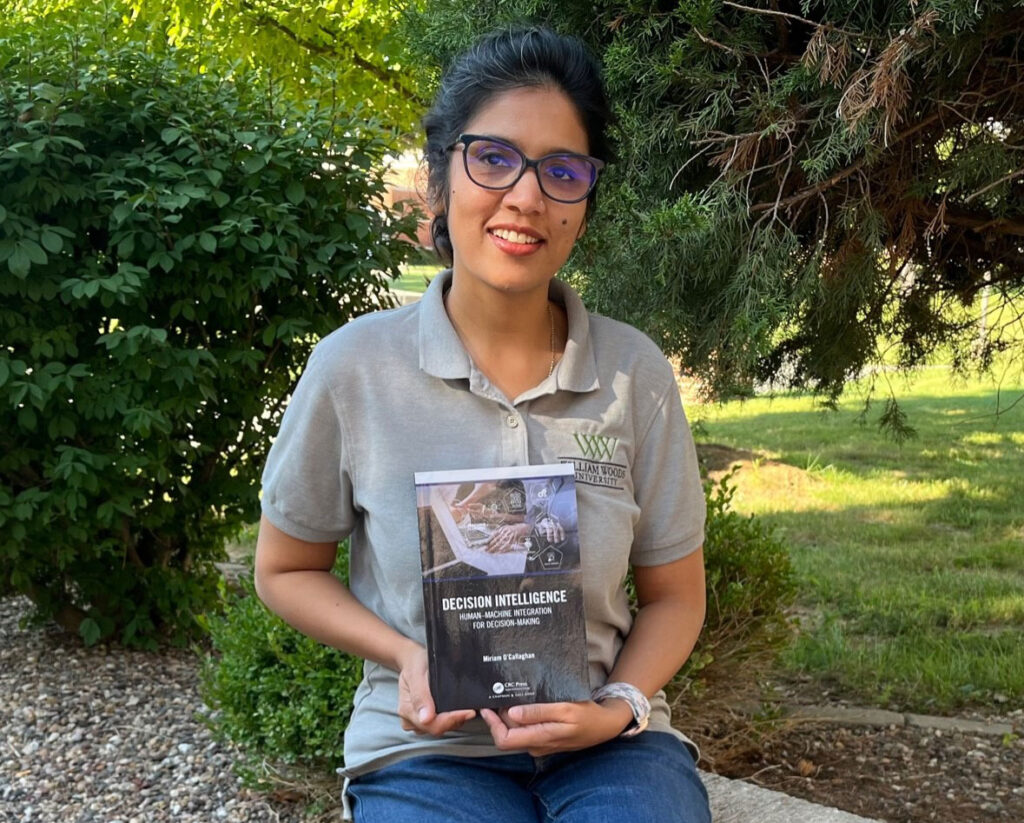Dr. Miriam O’Callaghan is certainly becoming accustomed to being an author.
Associate Dean of Research and Scholarship and a member of the William Woods faculty since 2018, Dr. O’Callaghan is taking on one of the most fascinating – and some maintain controversial – subjects of the day in her third book, “Decision Intelligence – Human Machine Integration for Decision Making.”
Published earlier this year, the book explores the rise and use of Artificial Intelligence (AI) in today’s world, a topic that neatly combines two of Dr. O’Callaghan’s passions – people and technologies.
“I’ve conducted extensive research into emotional intelligence, and it has always amazed me to see how our emotions and intuitions influence and cloud our decisions,” O’Callaghan said. “Today, machines are also integral decision-makers, but their decisions are not biased like ours. As AI models continually advance, I became more curious to learn if these models make better decisions compared to us humans. So I delved deeper into the study of AI system design and autonomous agents and discovered so many things that enlightened me and changed the way I thought about AI”
“I felt an obligation to share my insights with a broader audience, leading to the decision to pen this book.”

Like many groundbreaking innovations, AI is not inherently controversial, O’Callaghan maintains, but only is controversial in how the power of it is utilized. But there is no doubt that this technology is evolving at an astonishing rate, and is here to stay. O’Callaghan remains an optimist about its future.
“I have faith in the actions and decisions of global actors – individuals, organizations and nations – that strive to employ AI for the betterment of humanity and our planet,” she said. “However, I am not blind to the darker forces at play.”
In Chapter eight of her book, O’Callaghan shares examples of AI’s unethical use, illustrating instances where a government agency from a particular country exploited the technology to discriminate against specific religious communities.
“If we could create policies around the ethical use of AI in time, we can definitely prevent potential damage from these technologies,” she said. “My outlook towards the future of A.I. is more positive than negative.”
A native of India who also worked in Australia, O’Callaghan also teaches Business Management and Administration courses to both graduate and undergraduate students in addition to her responsibilities as Associate Dean at WWU. She has mastered the art of producing painstakingly researched, thought-provoking books during her time on the William Woods faculty.
“My work at the university always takes precedence – when I am actively working on campus, I devote all my time to my professional responsibilities, my courses and my students,” she said. “However, I never stop thinking about new ideas. Then, during my downtime, I research those ideas and let them incubate. When I eventually have extended breaks, such as those in the summer and winter, I transform those ideas into drafts and, subsequently, complete manuscripts.”
“In academia, particularly within colleges and universities, research stands as a powerful driver of professional growth,” she added. “It’s a common misconception that frequent publishing detracts from core work responsibilities. That’s not true! If you know how to organize your life around your priorities, you can excel in almost anything you want.”
“Decision Intelligence – Human Machine Integration for Decision Making” is currently actively selling in both the U.S. and in international markets. It is available on Amazon (https://www.amazon.com/Decision-Intelligence-Miriam-OCallaghan/dp/1032384093), bookstores like Barnes and Noble (https://www.barnesandnoble.com/w/decision-intelligence-miriam-ocallaghan/1142707898), or through the publisher’s website at: https://www.routledge.com/Decision-Intelligence-HumanMachine-Integration-for-Decision-Making/OCallaghan/p/book/9781032384092

